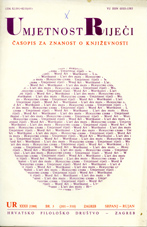Kazivanje neizrecivog (na temu književnosti i psihologije)
Expressing the Inexpressible (On the theme of literature and psychology)
Author(s): Mladen MachiedoSubject(s): Literary Texts
Published by: Hrvatsko filološko društvo
Summary/Abstract: In the text under the title Expressing the Inexpressible (On the Theme of Literature and Psychology) the author explores the two-way links between scientific theories and the pertinent literary context. Impulses from antiquity (for example when Herodotus "corrects" Freud) and Italy (Boccaccio, Marino, etc., all the way to Pirandello's analysis of Giusti) belong to "non-normative" psychology. The historical role of Lombroso was established on the cross-roads between related titles and the theses of Dostoevsky, Dossi's .autodiagnoses« and Kamov's Dried up Quagmire (= psyche). Bergson was amplified by Proust, Ungaretti, Pirandello and Eco (the last two have been indebted to Laughterj. Freud has been treated as a critic of literary and artistic activities; he was amplified by Italo Svevo (the novelist and Joyce's eye-witness), Saba, Pirandello, Breton ... The revaluation of Italian Surrealism is of considerable importance, with forerunners such as Savini (the creator of numerous changes) and Giorgio De Chirico (painter and participant of Nadja), while the links between man's interior and history have been explored by Moravia and Gadda. The poetry of Neo-Avantgarde is permeated by Lacan's theses: Sanguinetti's Latin tautology and Zanzotto's micro - aesthetics. A latent vertical dialogue has been conducted by the author of the text and criticism: since the emergence of psychoanalytical biography (the forgotten Leonardo by E. Solmi), through the revision of Freud (Fromm, Marcuse, Timpanaro), disputation Oung, Croce, Lopez, Meletinski), the foregrounding of psychoanalysis (Domenach, Sollers, Orlando, Agosti), its literal application or "authoritative" exlusiveness (Lavagetto, M. David), or the shift towards the symbolic (after Frye) ... all the way to Krieger's .psychoanalysis« of the critic himself and Calvino's quotation which (partly) accounts for the title of the essay. The manifolded historicity of the literary-psychological examples tries to compensate for the lack of perspective in the sense of a usual "terminus ad quem".
Journal: Umjetnost riječi
- Issue Year: 1988
- Issue No: 3
- Page Range: 207-245
- Page Count: 39
- Language: Croatian
- Content File-PDF

